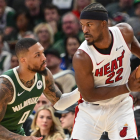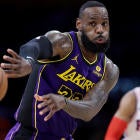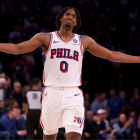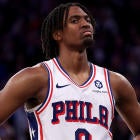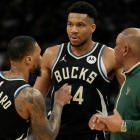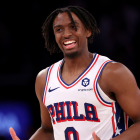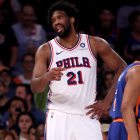Friday's Paul George trade had wide-ranging ramifications around the NBA. As well as the Indiana Pacers heading to the lottery and Russell Westbrook having one big reason to sign a contract extension with the Oklahoma City Thunder, the deal closed the door on the Boston Celtics' dream of pairing George with Gordon Hayward this summer. It killed John Wall's hopes of acquiring George through a sign-and-trade with Otto Porter. It might even scare the Los Angeles Lakers, who plan to pitch George on a homecoming this time next year.
In the bigger picture, though, it had one other major effect: widening the already substantial gap between the Eastern and Western Conferences. It's more of a gulf now, and it could get even bigger in the coming days.
If the Atlanta Hawks watch Paul Millsap walk the way they are expected to, then they could join the Pacers and the Chicago Bulls falling out of the Eastern Conference playoff picture. That would leave the Celtics, Cleveland Cavaliers, Toronto Raptors and Milwaukee Bucks as the conference's only locks for next year's postseason, assuming that Toronto is able to retain free agents Kyle Lowry and Serge Ibaka. It is not inconceivable for the Philadelphia 76ers, coming off a 28-win season, to not only sneak into the playoffs, but be better than the eighth seed.
The West, meanwhile, is only getting tougher. With a new core that will include Jimmy Butler, Jeff Teague and perhaps even J.J. Redick, the Minnesota Timberwolves will go from a fun, up-and-coming team to having a seat at the table with the serious squads. The Thunder will be expected to win at least 50 games. If the Suns or Nuggets wind up with Millsap, they will be making a statement that they want to win now, too. Such a move would also likely be the end of Millsap's days as an All-Star. Last season, Rudy Gobert, Chris Paul, Mike Conley and Damian Lillard were snubbed from the NBA's February showcase. Next time, guys like Klay Thompson and Draymond Green could find themselves pushed out.
The consequences of stars migrating west go beyond just who plays in the All-Star Game. Adrian Wojnarowski said on ESPN that he thinks that, with George leaving the East, the Raptors will be more apt to bring back their core and compete rather than going young. Surely when the Celtics and Miami Heat meet with Hayward, they will be selling their how easy their path to the conference finals will be relative to his situation with the Utah Jazz. As premature as it may be to discuss LeBron James' 2018 free agency, should he go to Hollywood, he could make the East look like a different league entirely.
This East-West divide is nothing new and somewhat self-sustaining. It has reached the point, though, where it must be a part of every conversation about the NBA's player movement and power structure. Look at the New Orleans Pelicans, who have two legitimate stars in Anthony Davis and DeMarcus Cousins, and reportedly reached a deal early Saturday to bring back Jrue Holiday, but lack depth around them. The way things stand, re-signing Holiday would only be the first step in the front office's plan to become a playoff team. If the Pelicans were in the East, though, simply having Davis and Cousins on the same roster would give them a leg up on just about everyone else. If you don't think Cousins will take this into account when he becomes a free agent after next season, you're crazy.
All of this is not building toward a plea for the league to abolish conferences. Those have already been written, and the points within still stand. It is merely to point out that, the way things are going, the disparity between East and West is perhaps more ridiculous than ever before. If this winds up being even a small factor in the Jazz -- a team that has made all sorts of smart moves over the past few years to build a dangerous, balanced, improving roster -- losing their franchise player, that will be a shame.














